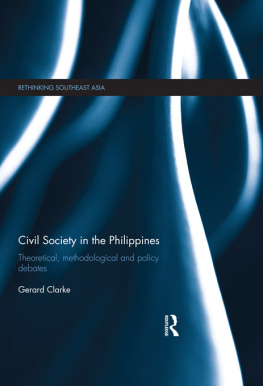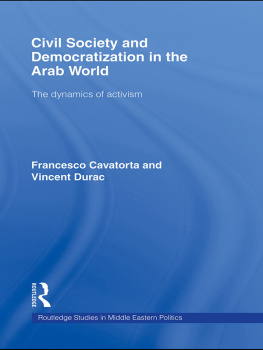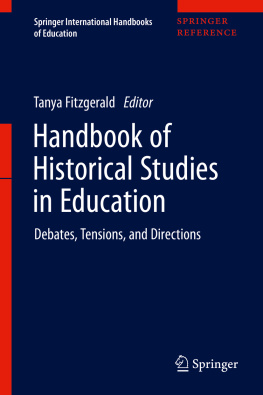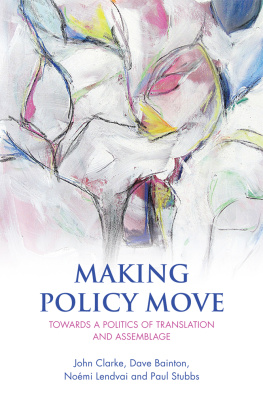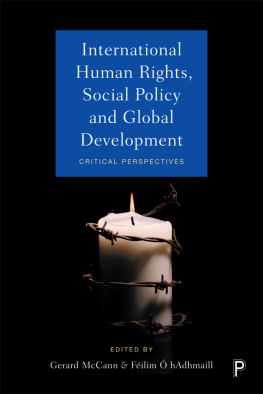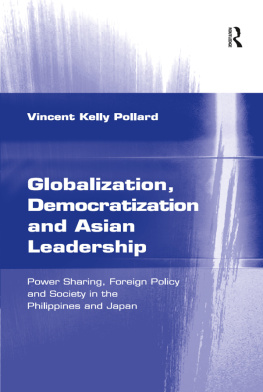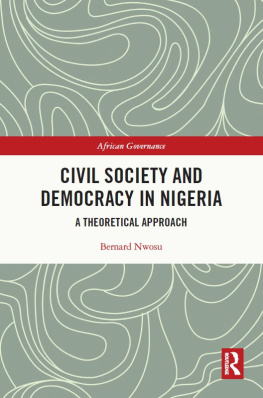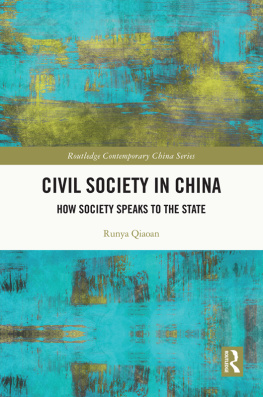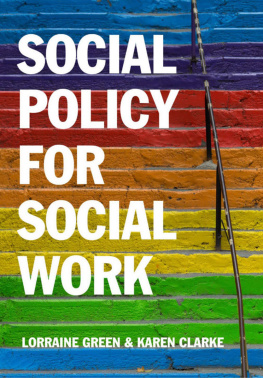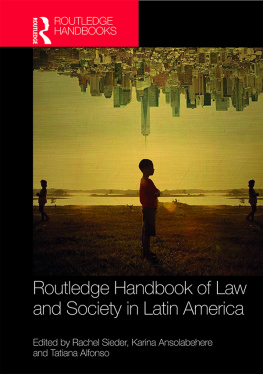Gerard Clarke - Civil Society in the Philippines: Theoretical, Methodological and Policy Debates
Here you can read online Gerard Clarke - Civil Society in the Philippines: Theoretical, Methodological and Policy Debates full text of the book (entire story) in english for free. Download pdf and epub, get meaning, cover and reviews about this ebook. year: 2012, publisher: Routledge, genre: Politics. Description of the work, (preface) as well as reviews are available. Best literature library LitArk.com created for fans of good reading and offers a wide selection of genres:
Romance novel
Science fiction
Adventure
Detective
Science
History
Home and family
Prose
Art
Politics
Computer
Non-fiction
Religion
Business
Children
Humor
Choose a favorite category and find really read worthwhile books. Enjoy immersion in the world of imagination, feel the emotions of the characters or learn something new for yourself, make an fascinating discovery.
- Book:Civil Society in the Philippines: Theoretical, Methodological and Policy Debates
- Author:
- Publisher:Routledge
- Genre:
- Year:2012
- Rating:4 / 5
- Favourites:Add to favourites
- Your mark:
- 80
- 1
- 2
- 3
- 4
- 5
Civil Society in the Philippines: Theoretical, Methodological and Policy Debates: summary, description and annotation
We offer to read an annotation, description, summary or preface (depends on what the author of the book "Civil Society in the Philippines: Theoretical, Methodological and Policy Debates" wrote himself). If you haven't found the necessary information about the book — write in the comments, we will try to find it.
Gerard Clarke: author's other books
Who wrote Civil Society in the Philippines: Theoretical, Methodological and Policy Debates? Find out the surname, the name of the author of the book and a list of all author's works by series.
Civil Society in the Philippines: Theoretical, Methodological and Policy Debates — read online for free the complete book (whole text) full work
Below is the text of the book, divided by pages. System saving the place of the last page read, allows you to conveniently read the book "Civil Society in the Philippines: Theoretical, Methodological and Policy Debates" online for free, without having to search again every time where you left off. Put a bookmark, and you can go to the page where you finished reading at any time.
Font size:
Interval:
Bookmark:
University of Leeds, UK
Duncan McCargo
| 1 | Politics and the Press in Thailand Media machinations Duncan McCargo |
| 2 | Democracy and National Identity in Thailand Michael Kelly Connors |
| 3 | The Politics of NGOs in Indonesia Developing democracy and managing a movement Bob S. Hadiwinata |
| 4 | Military Politics and Democratization in Indonesia* Jun Honna |
| 5 | Changing Political Economy of Vietnam The case of Ho Chi Minh City Martin Gainsborough |
| 6 | Living at the Edge of Thai Society The Karen in the Highlands of Northern Thailand Claudio O. Delang |
| 7 | Thailand Beyond the Crisis Peter Warr |
| 8 | Virtual Thailand Media and culture politics in Thailand, Malaysia and Singapore Glen Lewis |
| 9 | Decentralization and Adat Revivalism in Indonesia The politics of becoming indigenous Adam D. Tyson |
| 10 | Truth on Trial in Thailand Defamation, treason, and Lse-Majest David Streckfuss |
| 11 | Civil Society in the Philippines Theoretical, methodological and policy debates Gerard Clarke |
by Routledge
2 Park Square, Milton Park, Abingdon, Oxon OX14 4RN
by Routledge
711 Third Avenue, New York, NY 10017
A catalogue record for this book is available from the British Library
Clarke, Gerard, 1965
Civil society in the Philippines : theoretical, methodological and policy debates / Gerard Clarke.
Includes bibliographical references and index.
1. Civil societyPhilippines. 2. Social justicePhilippines. 3. Power
(Social sciences)Philippines. 4. Economic developmentSocial
aspectsPhilippines. 5. PhilippinesSocial conditions. I. Title. II.
Series: Rethinking Southeast Asia ; 11.
HN713.C53 2012
303.37209599dc23
ISBN: 978-0-203-08512-7 (ebk)
by Wearset Ltd, Boldon, Tyne and Wear
Font size:
Interval:
Bookmark:
Similar books «Civil Society in the Philippines: Theoretical, Methodological and Policy Debates»
Look at similar books to Civil Society in the Philippines: Theoretical, Methodological and Policy Debates. We have selected literature similar in name and meaning in the hope of providing readers with more options to find new, interesting, not yet read works.
Discussion, reviews of the book Civil Society in the Philippines: Theoretical, Methodological and Policy Debates and just readers' own opinions. Leave your comments, write what you think about the work, its meaning or the main characters. Specify what exactly you liked and what you didn't like, and why you think so.

